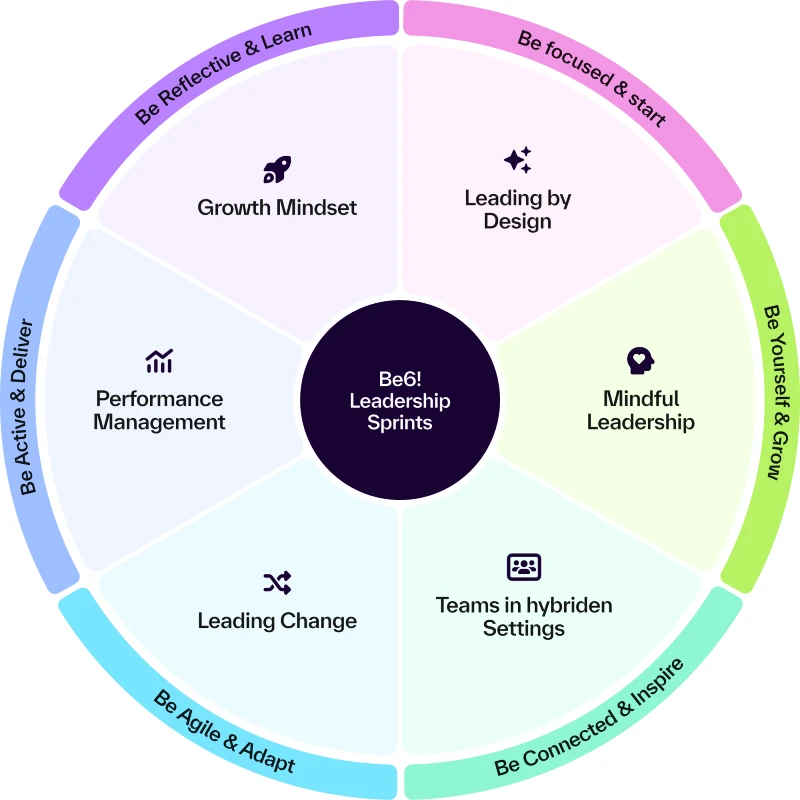Leadership is changing. New working models, technological developments and increasing demands on managers require innovative approaches to further training. Traditional methods such as theoretical training courses without direct practical relevance are no longer sufficient - what is needed are practical, scalable and holistic development formats that can be flexibly integrated into everyday working life.
Modern leadership means actively shaping change in the company, successfully leading hybrid teams and sharpening your own emotional intelligence. At the same time, dealing with artificial intelligence (AI) and digital tools is becoming increasingly important. Which methods will prevail? Which skills will be particularly in demand in the future?
This article shows the most important trends in management development and how you can prepare your management teams for them.
Which management development methods are in vogue?
Modern leadership requires new learning approaches - practical, flexible and sustainable. Which methods help managers to develop in a sustainable way? Below you will find an overview of the current trends.
Peer coaching: learning with and from each other in small groups
Peer coaching focuses on the exchange between like-minded people in order to further develop leadership skills in a practical way. Instead of relying on traditional top-down training, managers learn from each other in small groups - through reflection, feedback and joint problem-solving.
Why is peer coaching gaining in importance?
- Knowledge transfer at eye level: managers benefit from the experience of their peers who are facing similar challenges.
- Strengthening the ability to reflect: By asking specific questions and changing perspectives, managers develop a deeper understanding of their own actions.
- Direct practical relevance: The topics discussed are taken from real-life management situations and can be implemented immediately.
- Trusting learning environment: Regular exchanges create a network that lasts beyond the coaching sessions.
Success factors for effective peer coaching
- Structured sessions: A clear agenda helps to maintain focus and develop concrete solutions.
- Experienced moderation: A neutral person with coaching experience or an experienced manager can steer the process and provide impulses for reflection.
- Psychological safety: Trust and openness are essential to enable honest feedback.
- Sustainability through regularity: Continuous meetings ensure long-term learning and personal development.
Management development put to the test
ROL Quick Check
As a personnel developer , you are shaping tomorrow's leadership today - strategically, effectively, future-oriented. But are your programs already where they should be?
The ROL Quick Check provides you with a quick, practical impulse to determine where you stand - and initial starting points for further development. In just about 8 minutes, you answer 11 specific questions about leadership development.
Do the quick check and take your management development to the next level!
Design thinking: creative problem solving for managers
The design thinking method (creative problem-solving approach) is no longer just at home in product development - managers also use it to solve complex challenges in a structured and innovative way. At its core is a user-centered, iterative approach that leads to better decisions through interdisciplinary collaboration and creative thinking.
Why is design thinking relevant for managers?
- Mastering complexity: In a dynamic working environment, agile methods help to develop new solutions quickly and efficiently.
- Promote a culture of innovation: Managers who use design thinking establish a culture of experimentation and learning.
- Make better decisions: Targeted understanding of problems and iterative tests lead to well-founded solutions.
- Strengthen team dynamics: The method promotes collaboration, diversity of perspectives and an open feedback culture.
The six phases of design thinking
- Understanding: in-depth analysis of the needs of the team and the organization
- Observation: putting yourself in the shoes of employees and stakeholders
- Define the problem: formulate clear problems in order to develop targeted solutions
- Finding ideas: generating creative solutions through brainstorming and co-creation (collaborative creation process)
- Develop prototypes: Test approaches and obtain feedback from the team at an early stage
- Test and optimize: Adapt solutions iteratively to make them suitable for practical use
Successful application in management practice
Managers can use design thinking to support change processes (transformation processes), develop strategies collaboratively or strengthen the company's ability to innovate. The approach is particularly valuable in hybrid and interdisciplinary teams where different perspectives come together and innovative solutions are required.
Short on time? Learning in small, practical impulses
Managers are under constant time pressure - traditional training courses often do not fit into busy schedules. Compact learning formats that can be flexibly integrated into the working day are therefore in demand. Instead of all-day seminars or long online courses, companies are increasingly turning to microlearning and learning nuggets: short, concise impulses that deliver knowledge exactly when it is needed.
The leadership library for agile learning design
500+ learning nuggets for leadership development in a variety of formats for different levels of experience and learning preferences.
These could be five-minute podcasts on the way to work, a practical case study in the weekly newsletter or short reflection questions before an important meeting. Peer learning in short sessions or blended learning formats that combine online impulses with selective focus sessions are also gaining in importance.
Thanks to these approaches, managers no longer perceive further training as an additional appointment, but as a natural part of their daily routine - quick, practical and effective in the long term.
Targeted development of leadership skills with the Leadership Sprints
With the Leadership Sprints of the Haufe Akademie Managers receive practical, compact, and implementation-oriented learning units – perfect for a busy workday. Through intensive, interactive formats, they develop new perspectives, methods, and leadership approaches in a short period of time.
✔ Compact learning units for maximum efficiency
✔ Direct application in day-to-day management
✔ Interactive formats with high practical relevance
Learn more about Leadership Sprints
Holistic development approach
Leadership has long been more than just specialist knowledge and strategic decisions. Successful managers must demonstrate resilience, shape change and inspire people. Purely methodical training is no longer enough. What is needed is a holistic development approach that combines professional, personal and emotional skills.
Which core areas does this approach cover?
A holistic development approach integrates various aspects:
- Self-leadership & resilience: If you don't lead yourself well, you can't lead others successfully.
- Mindfulness & mental strength: Conscious reflection and stress management increase leadership quality in the long term.
- Empathy & strong communication skills: Emotional intelligence is becoming a key leadership skill.
- Strategic development: Long-term perspectives and innovative ways of thinking complement day-to-day business.
How do companies successfully implement the holistic development approach?
Many companies today combine traditional leadership training with coaching elements, peer feedback and mindfulness formats. Digital learning opportunities and face-to-face training are combined in such a way that managers are continuously developing - not only as decision maker, but also as drivers of a healthy corporate culture.
Scalable and digital formats: Leadership development for the modern working world
Traditional management development - characterized by face-to-face seminars and workshops lasting several days - is increasingly reaching its limits. Leadership is becoming increasingly agile, global and individual, which requires new learning formats. Scalable, digital solutions enable flexible, location-independent and tailored development of leadership skills.
Why are digital formats crucial?
- Flexibility and efficiency: Managers can decide for themselves when and where they learn - whether through on-demand courses, interactive webinars or learning nuggets.
- Personalized learning paths: Modern platforms enable individual development paths through adaptive content and needs-based recommendations.
- Scalability for companies: Digital formats can be rolled out globally so that managers at different locations receive equivalent training.
- Interactive & immersive learning experiences: Virtual reality(VR), gamification and collaborative online sessions create hands-on and engaging learning environments.
Scalable management development: flexible and efficient
The Leadership Kit of the Haufe Akademie supports companies in making their leadership development scalable, digital, and cost-effective. With ready-made learning modules, you can design your learning efficiently and resource-efficiently, allowing you to respond agilely to new needs.
✔ Digital & ready-to-use learning nuggets for maximum flexibility
✔ Scalable business solutions of any size
✔ Time- and cost-efficient training for managers
Learn more about the Leadership Kit
Examples of innovative digital training formats
- Virtual leadership programs: Online coaching, e-learning and interactive live sessions are increasingly replacing face-to-face seminars lasting several days.
- Hybrid learning platforms: A combination of digital self-study modules and short, face-to-face deep-dive sessions ensures sustainable development.
- Adaptive learning systemsModern learning platforms adapt content to the needs and progress of participants.
Which leadership skills are becoming more important?
Leadership is changing - and with it the demands on managers. Empathy, the ability to change and digital skills are more important today than ever before. If you want to lead successfully, you have to guide teams through change, manage hybrid working models and use technological developments with confidence. But which skills are crucial in order to remain effective in the modern working world?
Transformational Leadership
Transformational leadership focuses on change and empowers managers to navigate teams through change - not with rigid instructions, but through inspiration, vision and trust.
Why is this competence crucial?
Companies are facing ever faster market changes, technological upheavals and rising employee expectations. Managers must not only implement change, but also promote a culture of change. This can only succeed if they act as enablers and visionaries instead of limiting themselves to purely operational management.
Important elements of transformational leadership
- Develop a vision for the future: Change processes need a clear direction - an inspiring vision creates orientation and motivation.
- Involve employees: Participation and an open feedback culture promote acceptance and commitment.
- Establish a culture of learning: Mistakes are part of the process - successful leaders create an environment in which teams can develop.
- Using emotional intelligence: Change creates uncertainty - empathic leadership ensures trust and psychological security.
Mindful Leadership
At a time when stress levels are rising and the boundaries between work and private life are blurring, mindful leadership is becoming increasingly important. Managers who integrate mindfulness into their leadership style not only promote their own mental health, but also that of their team.
Instead of reacting to stress and overload, mindful managers focus on prevention and conscious working. They create a work culture that strengthens psychological safety, resilience and sustainable performance.
What characterizes mindful leadership?
- Presence & focus: Good leadership begins with attentiveness - conscious listening and clear communication are essential.
- Role model for balance: If you take breaks yourself, reflect and deal with stress in a healthy way, you encourage your team to do the same.
- Empathy & emotional intelligence: Employees who feel heard and understood are more motivated and committed.
- Sustainable decision-making: Mindfulness reduces impulsive action and promotes well-considered, long-term effective decisions.
Companies that promote mindful leadership benefit from lower staff turnover, higher team satisfaction and a sustainably high-performing organization.
Leading hybrid teams
Hybrid working, i.e. the combination of working on site and remotely, has long been the new normal - but managing distributed teams brings with it particular challenges. How can trust and team cohesion be strengthened when employees work both on site and remotely?
Successful managers adapt their management style to this new reality. They create structures that enable flexibility and, at the same time, rituals that strengthen team spirit.
Three success factors for leading hybrid teams
- Transparency and clear communication: Hybrid teams need clear expectations and standardized information channels. Regular meetings and asynchronous updates prevent remote employees from being left behind.
- Focus on results instead of a culture of attendance: Managers should measure performance not by attendance, but by results - with clear goals and a culture of trust.
- Strengthen cohesion: Hybrid teams need conscious meeting spaces, be it through virtual coffee breaks, regular offsite meetings or mixed workshop formats.
The best hybrid teams work because they combine flexibility with structure - and managers promote a culture that makes both possible.
Guided tour included
Modern leadership is more than just making decisions and setting targets - it means creating an environment in which all employees can develop their potential. Inclusive leadership goes beyond mere diversity guidelines: it ensures that diversity is actively promoted and valued.
Why is inclusive leadership essential?
Diversity alone is not enough - you need a management culture that enables equal opportunities and reduces unconscious bias.
Key factors of inclusive leadership
- Recognize unconscious prejudices: Managers reflect on their own thought patterns and avoid unconscious discrimination.
- Create psychological safety: Employees must feel heard and respected, regardless of gender, origin or background.
- Promotion through targeted measures: Mentoring programs, fair promotion processes and flexible working models support a diverse workforce.
- Using diversity as a strength: Those who consciously integrate different perspectives into decision-making processes create the basis for innovative solutions.
Inclusive leadership is not a "nice-to-have", but a success factor for future-oriented companies. Promoting diversity strengthens your team and the innovative power of the entire company.
Social and emotional intelligence
Above all, leadership requires social and emotional intelligence. Those who truly understand employees, recognize their needs and respond to them in a targeted manner create an environment in which people can grow.
Emotional intelligence encompasses self-awareness, self-regulation, empathy and social skills. Managers who master these skills build stronger relationships, resolve conflicts more effectively and motivate their team in the long term.
How does emotional intelligence strengthen leadership skills?
- Empathy creates trust: Employees feel valued and are more willing to communicate openly.
- Self-reflection promotes authentic leadership: those who understand and control their own emotions act in a considered and confident manner.
- Conflict resolution becomes more effective: Emotional intelligence helps to recognize tensions at an early stage and to moderate them in a solution-oriented manner.
- Employees are empowered: Those who recognize and specifically promote the strengths of their team ensure greater motivation and willingness to perform.
Digital Leadership
The digital transformation is also changing the role of managers. The advent of AI in companies in particular is placing new demands on managers: How does leadership change when algorithms support decisions? What skills are needed to keep pace with this development?
Changing role of managers in the age of AI
Managers are increasingly acting as bridge builders between people and technology. AI takes on repetitive tasks, analyzes large amounts of data and supports decision-making processes - but human leadership remains essential. The core task is to use technology sensibly, take employees along with you and set ethical guidelines.
What does that mean in concrete terms?
- Leadership is shifting from pure control to coaching and empowerment.
- Decisions are based more on data, but still require human judgment.
- Transparency and ethics are becoming increasingly important - AI is only as good as the data and algorithms it uses.
- Change management is becoming a core competence: employees must be supported and empowered in dealing with AI.
Build up your own expertise in AI
In order to lead successfully in an AI-driven working world, managers must actively develop their digital skills. It is not enough to understand AI as a buzzword - a solid knowledge of its potential, limitations and risks is crucial. AI for managers in particular plays a central role here, as it helps to use technology in a targeted manner, make informed decisions and guide employees through change
What skills are required?
- Basic understanding of AI and data analysis: Managers do not need to be programmers, but they should understand the functionality and logic behind AI systems.
- Critical thinking and ethical awareness: Anyone who uses algorithms must reflect on their effects and manage them responsibly.
- Change management skills: The use of AI brings with it uncertainties - managers should accompany teams through the change and promote acceptance.
- Digital experimentation: Innovation requires the courage to try out new tools and continuously adapt processes.
Building digital leadership skills in a targeted manner
Digital transformation and the use of AI are placing new demands on managers. With the AI training courses offered by Haufe Akademie Managers acquire practical knowledge about data analysis, ethical issues and the strategic use of AI in corporate management.
✔ Developing AI skills for sustainable leadership
✔ Practical training for the safe use of AI technologies
✔ Strategies for the successful use of AI in companies
Learn more about AI skills for managers
Conclusion: Sustainable leadership requires continuous development
The demands placed on managers are changing rapidly - and with them the ways in which managers are developed. Peer coaching, digital learning formats, mindful leadership and AI skills are no longer niche topics, but key success factors.
If you want to lead in a sustainable way, you need flexibility, a willingness to learn and a clear attitude. It is no longer just about methodological knowledge, but about the ability to inspire people, actively shape change and use technology sensibly.
The Haufe Akademie offers companies practical Development Programs that address precisely these needs: from digital learning formats to change management and digital leadership. This allows managers to develop in a targeted manner – while simultaneously fostering a future-oriented, resilient, and motivated corporate culture.





